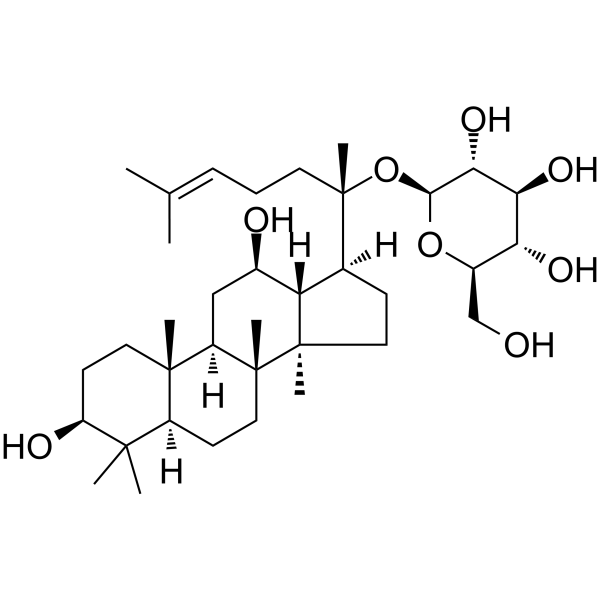天然产物 糖类和糖苷 Saccharides and Glycosides
Ginsenoside C-K;(Synonyms: 人参皂苷 C-K; Ginsenoside compound K; Ginsenoside K) 纯度: 98.04%
Ginsenoside C-K 是一种 Ginsenoside Rb1 的细菌代谢物。Ginsenoside C-K 通过抑制诱生型一氧化氮合酶 (iNOS) 和 COX-2 来发挥抗炎作用。在人肝微粒体中,Ginsenoside C-K 抑制 CYP2C9 和 CYP2A6 活性,IC50 分别为 32.0±3.6 μM和 63.6±4.2 μM。

Ginsenoside C-K Chemical Structure
CAS No. : 39262-14-1
| 规格 | 价格 | 是否有货 | 数量 |
|---|---|---|---|
| 10;mM;*;1 mL in DMSO | ¥1028 | In-stock | |
| 5 mg | ¥750 | In-stock | |
| 10 mg | ¥1350 | In-stock | |
| 50 mg | ; | 询价 | ; |
| 100 mg | ; | 询价 | ; |
* Please select Quantity before adding items.
Ginsenoside C-K 相关产品
bull;相关化合物库:
- Natural Product Library Plus
- Bioactive Compound Library Plus
- Immunology/Inflammation Compound Library
- Metabolism/Protease Compound Library
- Natural Product Library
- Anti-Aging Compound Library
- Antioxidants Compound Library
- Glycoside Compound Library
- Lipid Compound Library
- Oxygen Sensing Compound Library
- Medicine Food Homology Compound Library
- Terpenoids Library
- Pyroptosis Compound Library
- Traditional Chinese Medicine Monomer Library
- Neuroprotective Compound Library
- Anti-Pancreatic Cancer Compound Library
- Microbial Metabolite Library
- Angiogenesis Related Compound Library
- Anti-Colorectal Cancer Compound Library
| 生物活性 |
Ginsenoside C-K, a bacterial metabolite of G-Rb1, exhibits anti-inflammatory effects by reducing iNOS and COX-2. Ginsenoside C-K exhibits an inhibition against the activity of CYP2C9 and CYP2A6 in human liver microsomes with IC50s of 32.0±3.6 μM and 63.6±4.2 μM, respectively. |
||||||||||||||||
|---|---|---|---|---|---|---|---|---|---|---|---|---|---|---|---|---|---|
| IC50 Target[1][4] |
|
||||||||||||||||
| 体外研究 (In Vitro) |
Ginsenoside C-K, a bacterial metabolite of G-Rb1, exhibits anti-inflammatory effects mainly by reducing inducible nitric oxide synthase (iNOS), cyclooxygenase (COX)-2, and proinflammatory cytokines. Ginsenoside C-K suppresses the expression of proinflammatory cytokines by downregulating the activities of IRAK-1, MAPKs, IKK-α, and NF-κB in LPS-treated murine peritoneal macrophages. Ginsenoside C-K also suppresses the expression of iNOS and COX-2 by inhibiting NF-κB signaling in LPS-stimulated RAW264.7 cells. In zymosan-treated bone-marrow-derived macrophages (BMDMs) and RAW264.7 cells, Ginsenoside C-K inhibits inflammatory responses by negatively regulating the secretion of proinflammatory cytokines, the activation of MAPKs, and the generation of ROS. In addition, anti-inflammatory activity of Ginsenoside C-K has been observed in LPS-stimulated microglial cells. Ginsenoside C-K hinders inflammatory responses by controlling both the generation of ROS and the activities of MAPKs, NF-κB, and AP-1[1]. Ginsenoside C-K, a major metabolite of ginsenosides in the gastrointestinal tract, inhibits NF-κB signaling in a PXR-dependent manner. Ginsenoside C-K is shown to promote recovery of dextran sulfate sodium (DSS) -induced colitis by suppressing NF-κB activation. Ginsenoside C-K significantly reduces TNF-α-induced upregulation of IL-1β and iNOS mRNA levels, and restores the mRNA levels of PXR and CYP3A4 in LS174T cells[2]. Ginsenoside C-K, one of the intestinal metabolites of 20(S)-protopanaxadiol derivatives, exhibits an inhibition against the activity of CYP2C9 in human liver microsomes with an IC50 value of 32.0±3.6 μM, a weak inhibition against the activity of CYP2A6 in human liver microsomes with an IC50 value of 63.6±4.2 μM, and an even weaker inhibition against the activity of CYP2D6 in human liver microsomes with an IC50 value of more than 100 μM[4]. MCE has not independently confirmed the accuracy of these methods. They are for reference only. |
||||||||||||||||
| 体内研究 (In Vivo) |
The weight of the collagen-induced arthritis (CIA) mice increases slowly and is significantly less than that of the normal DBA/1 mice beginning on d 3 after injection of the emulsion. Ginsenoside C-K (28, 56, and 112 mg/kg) mice recover their weight by d 32 after the emulsion injection. Ginsenoside C-K (56 and 112 mg/kg) and Methotrexate (MTX)-treated (2 mg/kg) mice show significantly increased body weight on d 50 as compared with CIA mice. Hind paw-swelling began on d 24 post-immunization. CIA mice are treated from d 28 to d 50. Arthritis scores are measured every 4 d beginning on d 24. Ginsenoside C-K (56 and 112 mg/kg) significantly reduces the arthritis scores of the mice on d 51[3]. MCE has not independently confirmed the accuracy of these methods. They are for reference only. |
||||||||||||||||
| 分子量 |
622.87 |
||||||||||||||||
| Formula |
C36H62O8 |
||||||||||||||||
| CAS 号 |
39262-14-1 |
||||||||||||||||
| 中文名称 |
人参皂苷 C-K |
||||||||||||||||
| 运输条件 |
Room temperature in continental US; may vary elsewhere. |
||||||||||||||||
| 储存方式 |
|
||||||||||||||||
| 溶解性数据 |
In Vitro:;
DMSO : ≥ 100 mg/mL (160.55 mM) * “≥” means soluble, but saturation unknown. 配制储备液
*
请根据产品在不同溶剂中的溶解度选择合适的溶剂配制储备液;一旦配成溶液,请分装保存,避免反复冻融造成的产品失效。 In Vivo:
请根据您的实验动物和给药方式选择适当的溶解方案。以下溶解方案都请先按照 In Vitro 方式配制澄清的储备液,再依次添加助溶剂: ——为保证实验结果的可靠性,澄清的储备液可以根据储存条件,适当保存;体内实验的工作液,建议您现用现配,当天使用; 以下溶剂前显示的百
|
||||||||||||||||
| 参考文献 |
|
| Cell Assay [2] |
LS174T cells are seeded in cell imaging dish. After overnight incubation, cells are treated with ginseng saponin extract (GSE) (100 μg/mL), Rb1 (10 μM), or Ginsenoside C-K (10 μM) for 3 hours, followed by an additional incubation with or without TNF-α (20 ng/mL) for 6 hours. At the end of the incubation, cells are harvested and fixed with 4% paraformaldehyde solution at 20°C for 20 minutes. After washing in PBS, cells are permeabilized with 0.2% Triton X-100 in PBS at room temperature for 5 minutes. After incubation in blocking buffer containing 0.1% Triton X-100 and 5% bovine serum albumin, cells are incubated with rabbit NF-κB p65 antibody at 4°C overnight and then with Alexa Fluor 488-conjugated anti-rabbit IgG antibody at room temperature for 30 minutes in 1% bovine serum albumin in PBS. Fluorescence photographs are obtained using a Zeiss 710 confocal microscope[2]. MCE has not independently confirmed the accuracy of these methods. They are for reference only. |
|---|---|
| Animal Administration [3] |
Mice[3] MCE has not independently confirmed the accuracy of these methods. They are for reference only. |
| 参考文献 |
|
